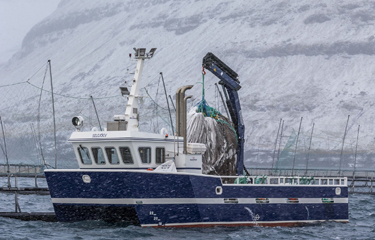Bakkafrost Group has posted total operational earnings before interest and taxes (EBIT) of DKK 70.5 million (USD 11 million, EUR 9.5 million) for the third quarter of 2021, a decrease of more than DKK 32 million (USD 5 million, EUR 4.3 million) from the DKK 102.7 million (USD 16 million, EUR 13.8 million) it delivered a year previously.
The Faroe Islands-headquartered salmon farmer reported that the quarter’s results were weakened by several factors in both Scotland and the Faroe Islands, but that the market had seen “further normalization” following the disruptions caused by the COVID-19 pandemic.
Bakkafrost made a Q3 2021 profit of DKK 131.3 million (USD 20.4 million, EUR 17.7 million), down from DKK 176.8 million (USD 27.5 million, EUR 23.8 million) year-over-year However, for the first nine months of 2021, its profit was DKK 967.2 million (USD 150.6 million, EUR 130 million), compared with DKK 500.5 million (USD 77.9 million, EUR 67.3 million) in the corresponding period of 2020.
The group’s combined Faroe Islands farming and value-added processing segments delivered an operational EBIT of DKK 146.2 million (USD 22.8 million, EUR 19.7 million) in the last quarter, up from DKK 118.4 million (USD 18.4 million, EUR 15.9 million), with the Faroese farming segment making an operational EBIT of DKK 135.1 million (USD 21 million, EUR 18.2 million), and its Scotland (SCT) farming segment with an operational EBIT loss of DKK 81.3 million (USD 12.7 million, EUR 10.9 million).
Its value-added products segment, which produced 5,299 MT of skinless and boneless portions of salmon, posted an operational EBIT of DKK 11.1 million (USD 1.7 million, EUR 1.5 million) in the last quarter, down from DKK 21.8 million (USD 3.4 million, EUR 2.9 million) in Q3 2020. However, for the first nine months of the year, its operational EBIT was DKK 91.4 million (USD 14.2 million, EUR 12.3 million), up from DKK 59.6 million (USD 9.3 million, EUR 8 million).
Meanwhile, Bakkafrost’s fishmeal, oil, and feed (FOF) segment delivered earnings before interest, taxes, depreciation, and amortization (EBITDA) of DKK 111.2 million (USD 17.3 million, EUR 15 million) in the last quarter, up from the DKK 69.5 million (USD 10.8 million, EUR 9.3 million) achieved in Q3 2020, with its sales of fishmeal reaching 44,973 MT. Some 1,992 MT of this feed was sold to external customers.
In total, Bakkafrost harvested 21,851 metric tons (MT) gutted-weight of salmon in the three-month period, up slightly on Q3 2020, with its Faroes operations providing an increased 14,937 MT and its Scottish operations a lower 6,914 MT. The total harvested volume for the first nine months of 2021 was 71,075 MT, up from 60,424 MT a year ago.
Due to an exceptionally high mortality in Scotland during Q3, Bakkafrost has lowered its expected harvest volume for Scotland to 30,000 MT gutted-weight. As such, the total harvest volume for 2021 is expected to be 96,000 MT gutted-weight, compared with 85,686 MT harvested in 2020.
Bakkafrost CEO Regin Jacobsen said in Scotland, Bakkafrost saw “significant biological challenges” at some of its farming sites where the fish had reduced gill health, and that at the end of the quarter, sudden biological issues occurred, including micro-jellyfish blooms, which caused significant mortalities.
“It was to some relief that we in September could deploy our new farming-supply vessel, Bakkanes, into operation in Scotland to do treatments,” Jacobsen said. “As we progress further with our planned investments in Scotland, the biological risk will be reduced with more preventive- and treatment-vessel capacity to protect gill health of the fish. Already in 2022, we will have more freshwater treatment capacity available and once our new hatcheries will be completed and produce large smolt, this will be game-changing for the operation. The improvements will be gradual, and it will take some years to achieve the transformation we are planning for.”
In the Faroes, the decision was made to advance harvest of the A72 Haraldsund farming site to regain synchronized production plans with the neighboring A-72 Viðareiði site, Jacobsen said.
“This resulted in higher costs, lower harvest weights and price achievements in this quarter. This is a one-off and, going forward, we will benefit from having the sites synchronized with better control of biological risks and enhanced operational efficiency," Jacobsen said.
The company’s Q3 results were also “negatively affected” by delays in the installation of new delousing equipment on M/S Martin, which is Bakkafrost’s main delousing farming supply vessel in the Faroes, Jacobsen said.
“These delays were in part caused by COVID-related supply issues and caused loss of precious time and momentum in our preventive delousing operation,” he said. “In turn, this has led to higher mortalities in this quarter.”
Jacobsen said global salmon supply increased around 6 percent in the last quarter, compared with Q3 2020, with prices up 14 percent.
“Bakkafrost has increased the sale to the foodservice industry to 65 percent of the harvested volume in the Faroe Islands, much in line with our strategy,” he said.
Looking ahead, Bakkafrost expects its Faroese harvest volumes to reach 68,000 MT gutted-weight in 2022, while 35,000 MT will come from its operations in Scotland, giving the group a total of 103,000 MT next year, Jaconbsen reported.
Photo courtesy of Bakkafrost







